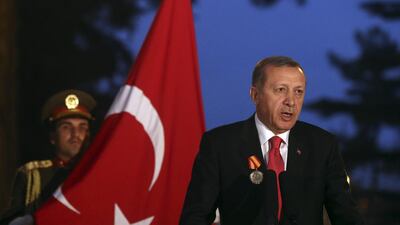Bashing Turkey for its apparent ambivalence towards ISIL and its foot-dragging over joining the coalition has seemingly become obligatory in the West. Doing so dovetails easily with the general narrative of recent Turkish bad behaviour: muzzling its press, tear-gassing protesters, and claiming to be the victim of foreign conspiracies.
All this is usually accompanied by restating that Turkey is more anti-Kurdish and anti-Assad than it is anti-ISIL. Many news reports from Kobani include reference to the Turkish tanks “simply watching” from the top of the hill across the border, as if a column of its tanks could drive into another country without a political decision to declare war. Turkey should at least have armed Kobani’s Kurdish defenders, some say, as if it were possible for Ankara to give weapons to the Kurdistan Workers’ Party (PKK) now fighting ISIL in Kobani, an organisation it deemed a terrorist group during a 30-year insurgency.
All these criticisms presume the fight against ISIL is the central contest of the current crisis. As such, many can’t understand why Turkey doesn’t drop everything to join in and be on the right side of history.
It’s worth pointing out that the Turkish government has been trying, for several years, to win several related contests that now fall within the scope of this crisis. Several of these issues are, for Turkey, of an order of magnitude larger than the fight against ISIL and because of this many people in the country are dismayed at being criticised for not wholeheartedly jumping at the chance to be part of the US’s fight against ISIL.
Not the least of these contests is Turkey’s attempts to disarm the PKK. The shape of this contest can help explain one focal point of recent criticisms of Turkey: the tremendous risk the government seems to have taken with its policy towards the siege of Kobani.
In what seemed to be an attempt to ransom Kobani for an American commitment to wage war on the regime of Bashar Al Assad, the Turkish government outraged Kurds and provoked protests and street fighting in Turkey that left dozens dead.
What if Kobani had fallen and the PKK’s fighting leadership based in northern Iraq made good on its threats to terminate the peace process precariously in place with the Turkish government? How could the government risk Kobani becoming such a potent symbol of what many Kurds consider Turkey’s contempt?
A short answer is that Turkey believes it controls an even more powerful symbol, namely, Abdullah Ocalan, the nominal leader of the PKK, who has been in a Turkish prison since 1999.
Former Turkish prime minister and now president Recep Tayyip Erdogan has, for years, alternately denigrated Ocalan and facilitated opportunities for the PKK leader to exercise clout over Kurdish society. Both tactics have been designed to enhance Ocalan’s status as leader and symbol of the PKK and the entire Kurdish nationalist movement.
Meanwhile, the government isolates Ocalan on an island prison near Istanbul, controls who visits him and when, and dangles in front of him the one thing that he wants more than anything else: a transfer from solitary confinement to house arrest. Most presume that this is on offer in exchange for Ocalan delivering the disarmament of the PKK.
Some within the Kurdish national movement have implied a break with Ocalan is possible, but Turkey is betting it can maintain its position and that no branch of the Kurdish nationalist movement can actually risk breaking with Ocalan without sundering their whole enterprise. Recent Turkish airstrikes against PKK positions in south-eastern Turkey seem partially designed to demonstrate that the PKK leadership in northern Iraq cannot unilaterally contradict Ocalan’s policy that the peace process continue.
Even intense anger on the streets and radicalisation – often said to boost recruits to the PKK – is less of a strategic worry for the government if it believes it ultimately controls the PKK through Ocalan. Also, the prisoner has used his clout before to check unrest, and can again be used to manage the streets, prisons and youth.
To say the least, this is dangerous brinkmanship, with no guarantees. The government has shown – for example through the pro-government media – its willingness to use violence associated with the Kurdish nationalist movement as a way to boost support among Turkish nationalists. Polarisation, once again, shows up as a core political strategy.
Turkey’s stance towards ISIL can be criticised, but the government has just cast the extremists as something of a sideshow.
Turkey cannot do this with the PKK and the Kurdish nationalist movement. It is the country’s core issue.
Critiques and criticisms of Turkey should not ignore the issue’s moral and pragmatic dangers.
Caleb Lauer is a freelance journalist who covers Turkey

